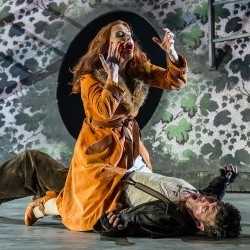The Cunning Little Vixen (Garsington Opera at Wormsley Estate)
Janáček’s bucolic tale, magically staged by Daniel Slater, is the ideal summer opera

© Clive Barda
Whereas other recent productions have given us Fantastic Miss Foxes with swishing tails and sharp ears, Slater’s Vixen blurs the lines between animal and human from the outset: we first see this vampish (but never trampish) Vixen Bystrouška sauntering into the village inn to paint her nails and sip a glass of red, clad simply in a white cotton frock, with her mane of Titian hair and fur-collared coat the only nods to her vulpine nature.
This all works beautifully in terms of emphasising the parallels between the Vixen and the local siren Terynka, beloved of Schoolmaster and Poacher alike. When the Vixen finally falls prey to the latter’s bullets, the devastated Forester is left holding the empty coat as the Poacher walks into the sunset with the ‘Vixen’ in her white dress.
I was initially apprehensive when I saw that both Vixen and Forester had dancer doubles (having been unconvinced by this strategy in the recent Eugene Onegin and Acis and Galatea at Covent Garden) but in the event Maxine Braham‘s choreography was quite wonderful. Chiara Vinci and Jamie Higgins mirrored the poetry and eloquence of Claire Booth and Grant Doyle‘s singing without things ever becoming distracting or confusing.
Booth’s Vixen is classy, sassy and superbly sung, without any of the twittery edginess that sometimes creeps into the role, and beautifully expansive in her ecstatic discovery of love. As the Forester, Doyle brings exactly the right mixture of lyricism and muscularity, particularly in his rhapsodic final musings on circles of life (and the closing image of him silhouetted against a setting sun was glorious).
"Clarity and vitality"
The macho bravado and vulnerability of Victoria Simmonds‘s Fox is touching and funny, and she copes well with the fearsome tessitura. Joshua Bloom‘s menacing, virile Poacher is also a powerful presence – and oddly sympathetic, despite his sinister appearance.
There’s not a weak link to be found amongst the many small roles, but even in such excellent company Anna Harvey‘s gleefully priapic Lapák shone – with her spivvy checked trousers and 'tache, she was so convincingly masculine that I thought we were to have a tenor Dog until she revealed a big, bright, characterful mezzo that’s surely destined for exciting things.
Katherine Crompton presided over a delightful gaggle of head-scarfed hens with fussy aplomb (their scene was so very funny that audience laughter obscured some of Janáček’s loveliest music!), and amongst the humans Timothy Robinson‘s melancholy Schoolmaster was quietly heart-breaking. The children playing fox-cubs and other forest-animals not only brought wonderful energy to their scenes but were also spot-on musically – as (a rocky patch at the climax of the wedding-scene aside) was pretty much everything, thanks to the clarity and vitality of Garry Walker‘s conducting.
As with Fidelio, the Wormsley Estate itself played its own special role in the proceedings: emerging from the staged woodland of designer Robert Innes Hopkins into the leafy twilight with the Forester’s transcendent meditation on nature still resounding in the ears has to be the most magical operatic experience of my year.












